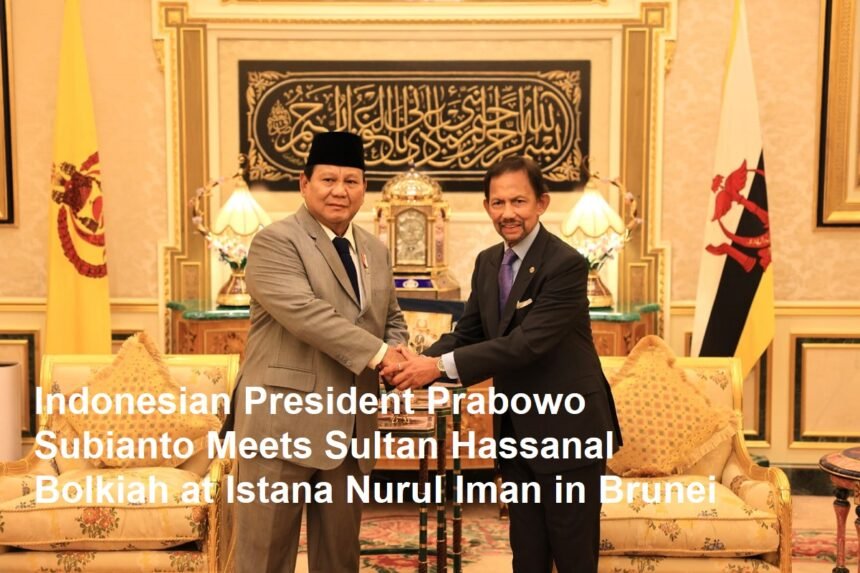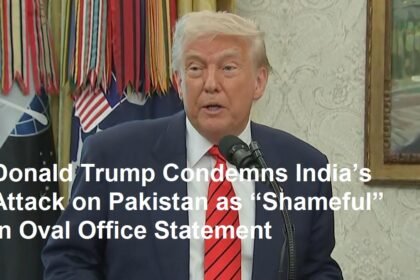On Wednesday, May 14, 2025, President Prabowo Subianto of the Republic of Indonesia arrived at Istana Nurul Iman in Bandar Seri Begawan, the capital city of Brunei Darussalam, to hold a significant meeting with His Majesty Sultan Haji Hassanal Bolkiah Mu’izzaddin Waddaulah, the Sultan of Brunei. This high-level encounter between two prominent Southeast Asian leaders underscores the enduring diplomatic ties and growing cooperation between Indonesia and Brunei, two key members of the Association of Southeast Asian Nations (ASEAN).
The meeting at Istana Nurul Iman, the world’s largest residential palace and the official residence of the Sultan, symbolizes the importance both nations place on strengthening bilateral relations. Indonesia and Brunei share a long history of cultural, religious, and economic connections, rooted in their common Malay heritage and Islamic traditions. Over the decades, these ties have evolved into multifaceted partnerships encompassing trade, investment, education, and regional security cooperation.
In recent years, Indonesia and Brunei have worked closely within ASEAN frameworks to promote regional stability, economic integration, and sustainable development. Both countries have expressed commitment to advancing ASEAN’s goals of fostering peace, prosperity, and connectivity in Southeast Asia. The meeting between President Prabowo and Sultan Hassanal Bolkiah is expected to build upon this foundation, exploring new avenues for collaboration and mutual benefit.
Key topics likely discussed during the meeting include enhancing economic cooperation, particularly in trade and investment. Brunei’s economy, heavily reliant on oil and gas exports, is seeking diversification, while Indonesia, as the largest economy in Southeast Asia, offers vast opportunities in various sectors such as manufacturing, infrastructure, and digital technology. Strengthening economic ties could involve joint ventures, technology transfer, and increased bilateral trade, benefiting both nations’ development agendas.
Another important area of focus is regional security and counterterrorism efforts. Both Indonesia and Brunei face challenges related to transnational crime, maritime security, and the need to maintain peace in the South China Sea and surrounding waters. Collaborative initiatives, intelligence sharing, and coordinated responses to security threats are vital components of their partnership. The leaders’ dialogue likely reaffirmed their commitment to working together within ASEAN and other international platforms to address these concerns.
Cultural and educational exchanges also form a significant part of Indonesia-Brunei relations. Both countries have promoted people-to-people connections through scholarship programs, cultural festivals, and religious cooperation. These initiatives foster mutual understanding and strengthen the social fabric linking the two nations. The meeting may have included discussions on expanding such programs to deepen ties at the grassroots level.
The strategic importance of this meeting extends beyond bilateral relations. As ASEAN continues to navigate complex geopolitical dynamics involving major powers, Indonesia and Brunei’s cooperation contributes to regional cohesion and collective resilience. Their partnership exemplifies ASEAN’s principle of unity in diversity and the pursuit of shared prosperity.
Furthermore, the meeting highlights Indonesia’s active diplomatic engagement under President Prabowo’s leadership, emphasizing the country’s role as a regional leader and advocate for ASEAN solidarity. For Brunei, hosting the Indonesian President reinforces its position as a key player in regional diplomacy and a custodian of Islamic and Malay cultural heritage.
In conclusion, President Prabowo Subianto’s visit to Istana Nurul Iman on May 14, 2025, to meet Sultan Hassanal Bolkiah represents a meaningful step in fortifying Indonesia-Brunei relations. The discussions likely covered a broad spectrum of issues, from economic collaboration and security cooperation to cultural exchange and regional diplomacy. This meeting not only strengthens the bilateral partnership but also contributes to the broader goals of ASEAN in promoting peace, stability, and prosperity in Southeast Asia. As both nations continue to work together, their alliance serves as a model of constructive engagement and mutual respect in the dynamic landscape of international relations.








